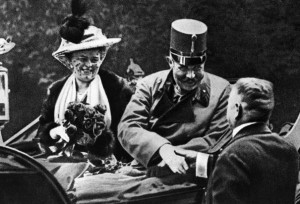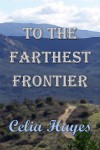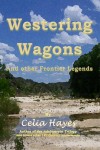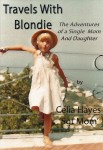 This weekend marks the hundredth anniversary of the incident which was the spark that set off the cataclysm of the First World War. Which wasn’t, strictly speaking, the first world-wide war; it could be argued that the Napoleonic Wars were, and the interminable European war between France and England which spilled over into those colonies in the North American continent could also be considered a world war.
This weekend marks the hundredth anniversary of the incident which was the spark that set off the cataclysm of the First World War. Which wasn’t, strictly speaking, the first world-wide war; it could be argued that the Napoleonic Wars were, and the interminable European war between France and England which spilled over into those colonies in the North American continent could also be considered a world war.
The spark was seemingly a simple thing – almost a non-story as it appeared in the English and American newspapers; the assassination of an Austrian noble and his wife by a barely competent yet very lucky Serbian amateur terrorist. This was an appalling tragedy for the family of the Archduke Franz-Ferdinand and his beloved spouse, Sophie, the Countess Hohenberg, who left three living children to be raised by the Archduke’s best friend. The assassination was perhaps an inconvenience more than a tragedy to the the court and administration of Franz-Ferdinand’s uncle, the Emperor Franz Joseph. The Archduke, who but for the accident of birth would have been a rather quiet and dutiful nonentity, devoted to gardening, architecture and the hunt – was not a particularly popular man at the time of his death, either with his uncle, his fellow aristocrats or the Viennese public. He replaced the popular but suicidal Crown Prince Rudolph as heir, and had insisted on marrying for love, instead of merely making Sophie his mistress. They were eventually permitted to marry with the assurance that Sophie and her children would not have the standing or rights of succession. Sophie – lovely and well-tempered, conventionally pious, and well-educated – was usually treated pretty shabbily by Viennese society and by the imperial establishment on those official occasions at which the Archduke was expected to be present. Franz Ferdinand did play his part dutifully in official ceremonies and events, without any particular appearance of enjoyment. What started as a personal tragedy, and a national crisis for Austria-Hungary was merely the first fall in a train of dominoes.
The war which raged between 1914 and 1918 unleashed a whole cornucopia of horrors, being that they were waged between powers that had been fully or almost fully industrialized. It came after a hundred years of relative peace, prosperity and progress in the Western world. With the exception of the Franco-Prussian War, and the American Civil War, such wars as there had been were colonial wars, fought by small professional Western armies against relatively primitive foes. Many, especially in the educated classes in the late 19th century firmly believed that total, all-out, balls-to-the-wall war was something that the advanced nations of the West had moved away from, that the economic consequences would be so dire that the powers-that-be just wouldn’t allow it to happen. Meanwhile, European military planners moved briskly ahead, paying little attention to the main lesson to have been drawn from the American Civil War – that technology had moved far ahead of established tactics. The pump had also been primed by a series of little-recollected international crises at the end of the 19th and start of the 20th, which flamed up regularly in a sort of international patch of eczema, usually involving France, or Germany, England, Russia or Austria-Hungary or any combination. The crisis would be soothed by the hastily-applied salve of diplomacy … until the next time.
The one thing in common was that the great powers were jockeying for position, sometimes straight out, and sometimes through proxies. The author of the War That Ended Peace outlined how England and Germany came to stand against each other, having been allies more often than not in their previous history. Great Britain, a navy/sea power if there ever was one, gradually began a policy of more engagement in Europe among the great powers. Germany, a quintessential army/land power (and only unified into a single nation within living memory) developed the intention of having a serious deep-water navy.
And so they drifted into enmity. Once that first domino toppled, then all the rest came as a matter of course over the next four blood-soaked years. Treaty obligations and mobilization of the reserves imposed an iron rule. When the dominoes finished falling in 1918, three noble ruling houses had been cast down and a whole generation of of German, French, British and Russian men were gutted. The unwieldy empire to which the archduke had been heir-presumptive broke into its’ constituent parts, and all the bright promise of the modern world as seen by Europeans at the turn of the century before the last was reduced to a nightmare … and left us with wreckage that we are still sorting out, even after a hundred years. The past isn’t dead. It’s not even over.
(cross-posted on my book-blog, and at www.ncobrief.com.)







Recent Comments